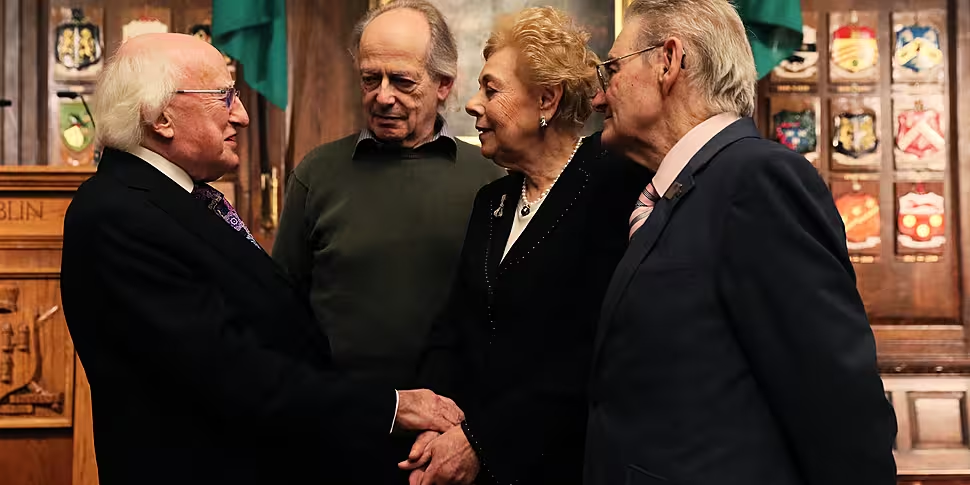In the summer of 1942 Tomi Reichental’s grandparents were taken to Auschwitz.
The dreaded knock on the door came from an old family friend, one who had known the Reichentals since he was a child.
Dressed head to toe in the black uniform of Slovakia’s Hlinka Guard, Lodovit Nedleka pulled a scrap of paper from his pocket and calmly told his devastated neighbours, “By order of the Interior Ministry, Jew Jecheskel Reichental and his wife Katarina, are to go with this defence officer. You are permitted to bring only what is absolutely essential.”
The family tears and pleas fell on deaf, uncaring ears. For months, Tomi’s father had been paying the authorities huge bribes to secure permits exempting them from deportation.
Further exemption papers were in the post but this was a detail of no importance to Nedleka.
The Germans and their enthusiastic Slovakian collaborators cared little for paperwork or the feelings of Jews. Since 1942, the Nazis had committed themselves to a ‘Final Solution to the Jewish Question’ and that meant the annihilation of European Jewry.
Tomi’s Granny Katarina hung up her apron, packed a bag for herself and her husband, and the couple left their village of Merašice for the last time.
After the war, the Reichentals learnt they had been murdered in Auschwitz. Most likely, they were gassed upon arrival.
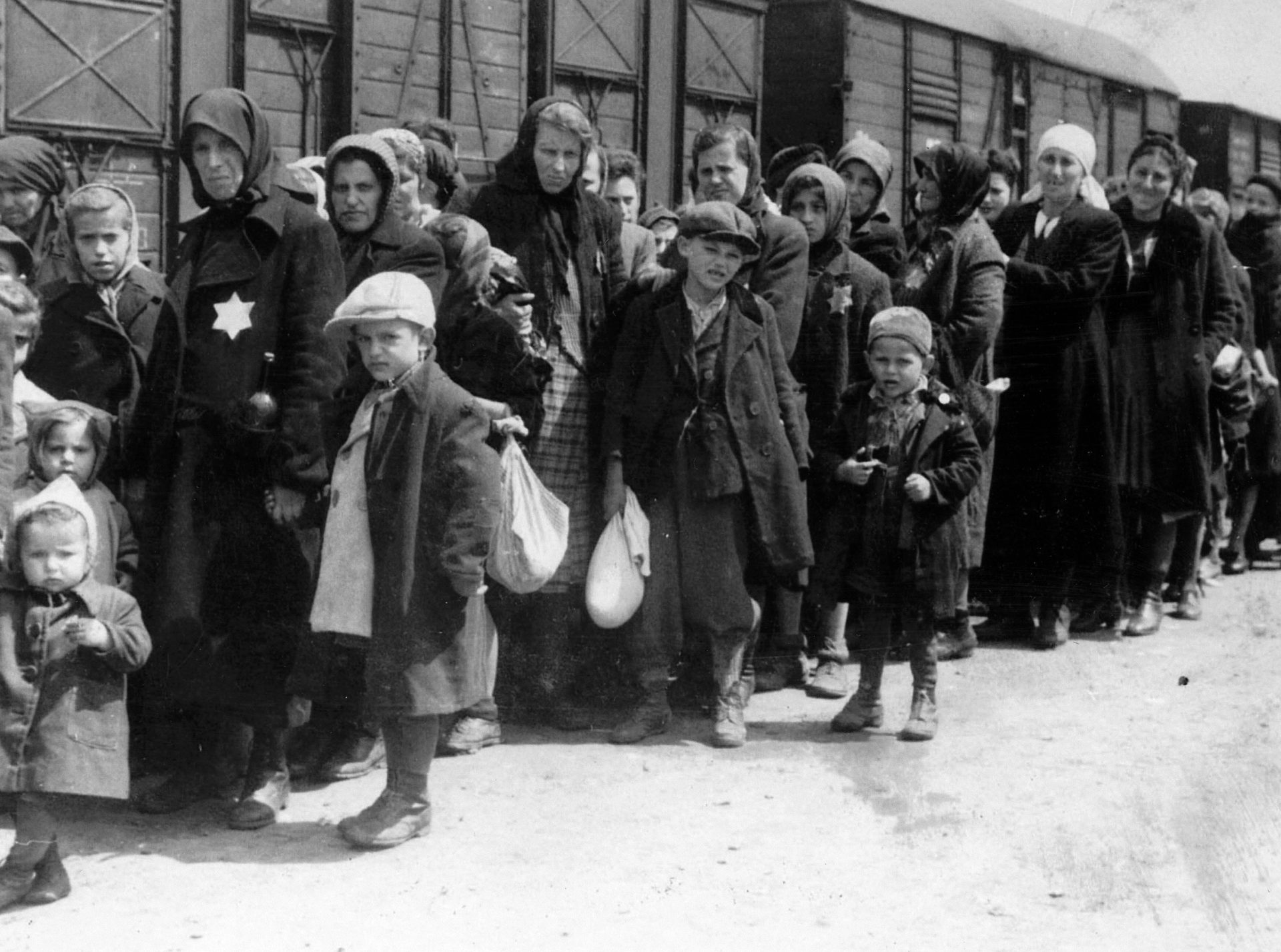 Arrival of a train containing Jews deported to Auschwitz death camp in Nazi-occupied Poland.
Arrival of a train containing Jews deported to Auschwitz death camp in Nazi-occupied Poland.They were just two of the 1.3 million people sent to the death camp during the Holocaust. Of the 1.1 million victims who perished there, the vast majority were Jews. The remainder were killed because they too failed to match Hitler’s vision of a perfect, Aryan world. Among them were Poles, Roma, gay people and prisoners of war.
In total, Tomi lost 35 members of his family in the Holocaust and 20 of them were murdered in Auschwitz alone. Like him, his parents and brother survived - despite a number of close shaves.
“What can I say? It was a miracle,” he told The Pat Kenny Show from his home in south Dublin.
In 1944, the Reichentals decided to go into hiding and a sympathetic Catholic priest obtained false papers for them with Christian sounding surnames.
Tomi and his brother were also taught how to cross themselves and recite Christian prayers in case they were questioned and their true identity revealed.
Tomi’s father decided to stay on in Merašice and look after the farm but his mother took the two boys to Bratislava. It was there, the trio were arrested.
Waiting for their mother in a photography shop, two Gestapo officers walked in on the boys.
“They came straight to my brother and they asked him, ‘You Jewish?’” Tomi recalled.
“My brother said, ‘No, I’m not Jewish’. They turned around to me and said, ‘You are Jewish.’
“I was a little boy, I was nine-years-old and I was very small; I got a smack in my face and they started to beat me up.
“I was only a kid – it hurt. I was crying, ‘Stop beating me’ and my brother said, ‘Stop, stop, we are Jewish.’”
Bergen Belsen
In November 1944, the Reichentals were deported to Bergen Belsen concentration camp in Germany.
Although not an extermination camp like Auschwitz, the camp was a cauldron of disease, hunger and cruelty. Some 50,000 people died at the camp, the most famous of whom was the teenage diarist Anne Frank.
Another of the victims was Tomi’s grandmother, Rosalia Scheimovitz.
“In short, it was Hell on earth,” Tomi said.
“On March 7th, I remember waking up, I saw my aunt and my mother crying and I said, ‘Why are you crying? What happened?’
“They told me that my grandmother had passed away, she just dried up. She didn’t drink enough water, she didn’t eat enough and her medication ran out.”
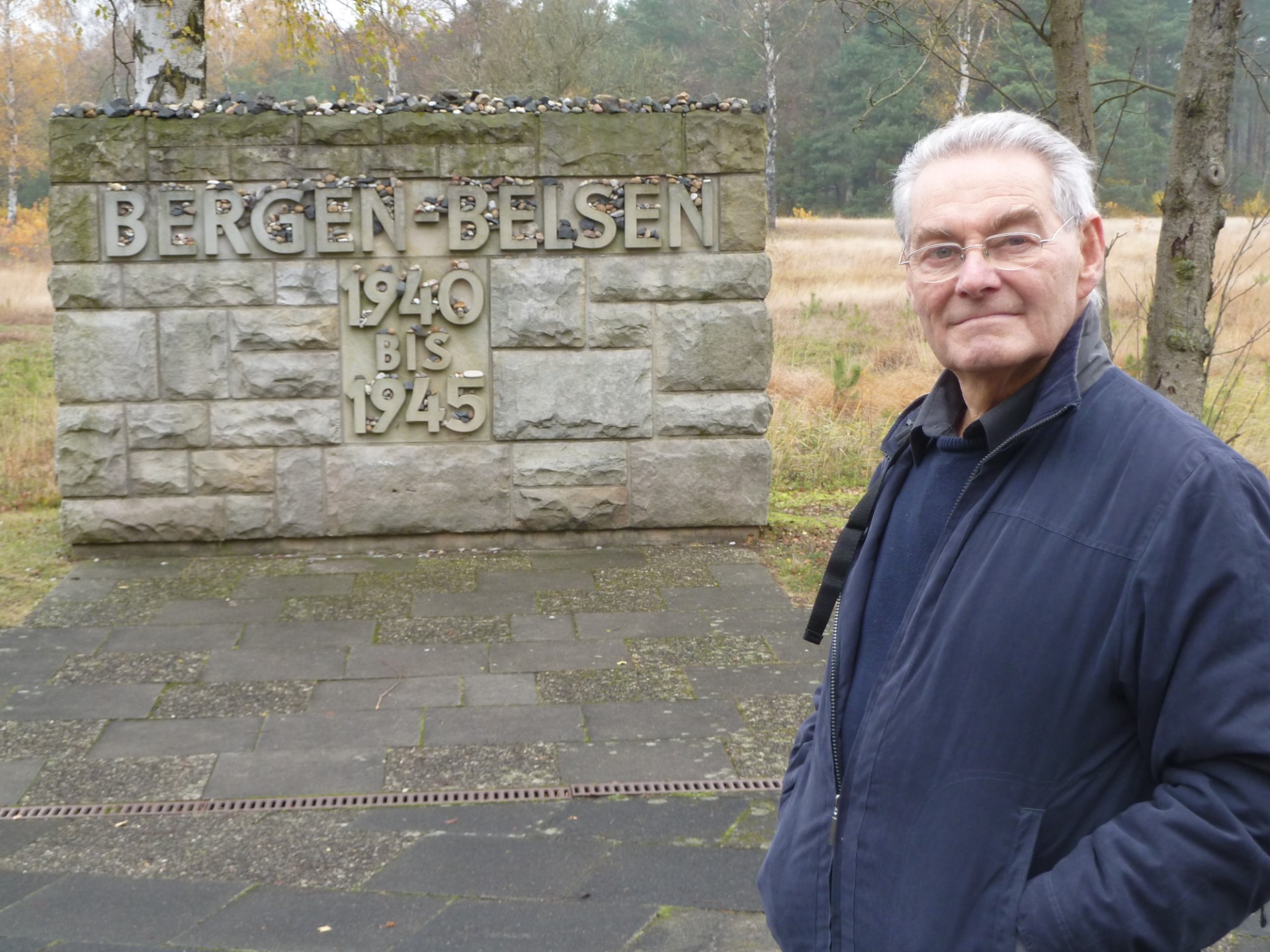 Tomi Reichental in Bergen Belsen. Picture by: Holocaust Education Ireland.
Tomi Reichental in Bergen Belsen. Picture by: Holocaust Education Ireland.Such was the pervasiveness of death in Bergen Belsen, the camp’s crematorium was unable to cope with the thousands of dead bodies and inmates were forced to let the corpses of their loved ones pile up as if they were little more than rubbish.
“We had to witness one of the most horrific experiences when they came to pick up the body of my grandmother,” Tomi said.
“It was the Sonderkommandos [burial team]; two men from the men’s camp and they would come with a cart with two vehicles.
“We had to strip my grandmother; one picked up her by the hand, the other by the legs and swung her onto the cart.
“I ran out, I wanted to see where my grandmother was buried and, of course, she was thrown on the pile of corpses and other corpses were then thrown over her.”
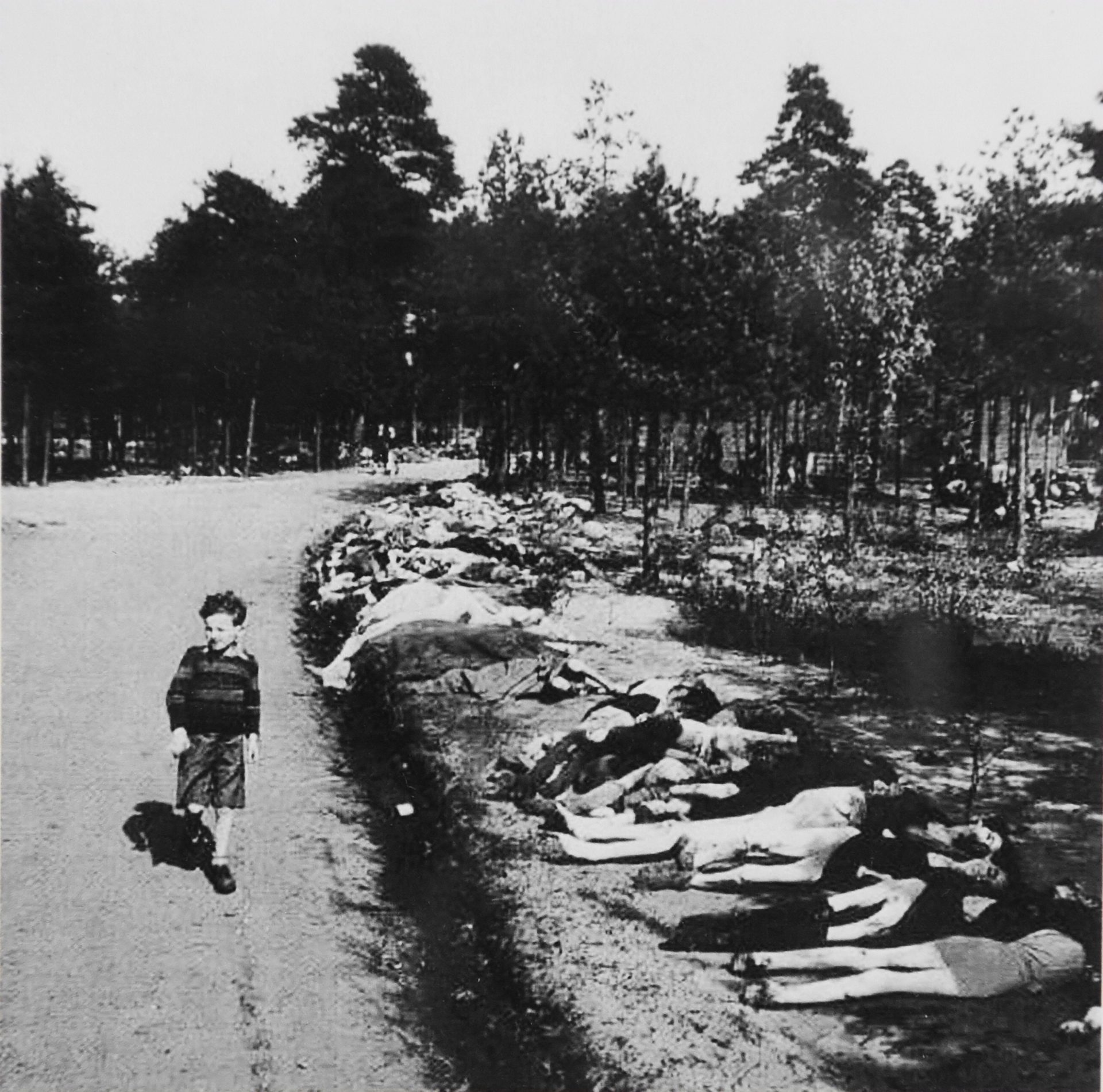 A child passes through a road lined with the dead from Bergen-Belsen Concentration Camp in 1945.
A child passes through a road lined with the dead from Bergen-Belsen Concentration Camp in 1945.Another inmate of Bergen Belsen was Suzi Diamond who, like Tomi, now lives in south Dublin.
Born Suzi Molnor into an Orthodox Jewish family in Karcag, Hungary, her father died after he was conscripted into the Slave Labour Service of the Hungarian Army.
Although she was only a toddler at the time, she vividly remembers the journey she took to the camp with her mother and brother.
“We were in a cattle truck for I don’t know for how long,” she told Newstalk.
“It was the wintertime and it was very crowded with barely room to sit and icicles were outside.
“When we arrived there was a whole lot of shouting and the Alsatians were barking and everybody was saying, ‘Hurry, hurry, hurry.’”
Suzi and her brother, Terri, were warned to stay away from the Germans but that did not prevent her from witnessing things most people only see in their worst nightmares.
“They didn’t treat children [very well],” she said, in something of an understatement.
“I remember one time watching one of the Alsatians and the dog was eating something.
“Suddenly, I realised what it was eating, it was eating a newborn baby and the baby was still alive.”
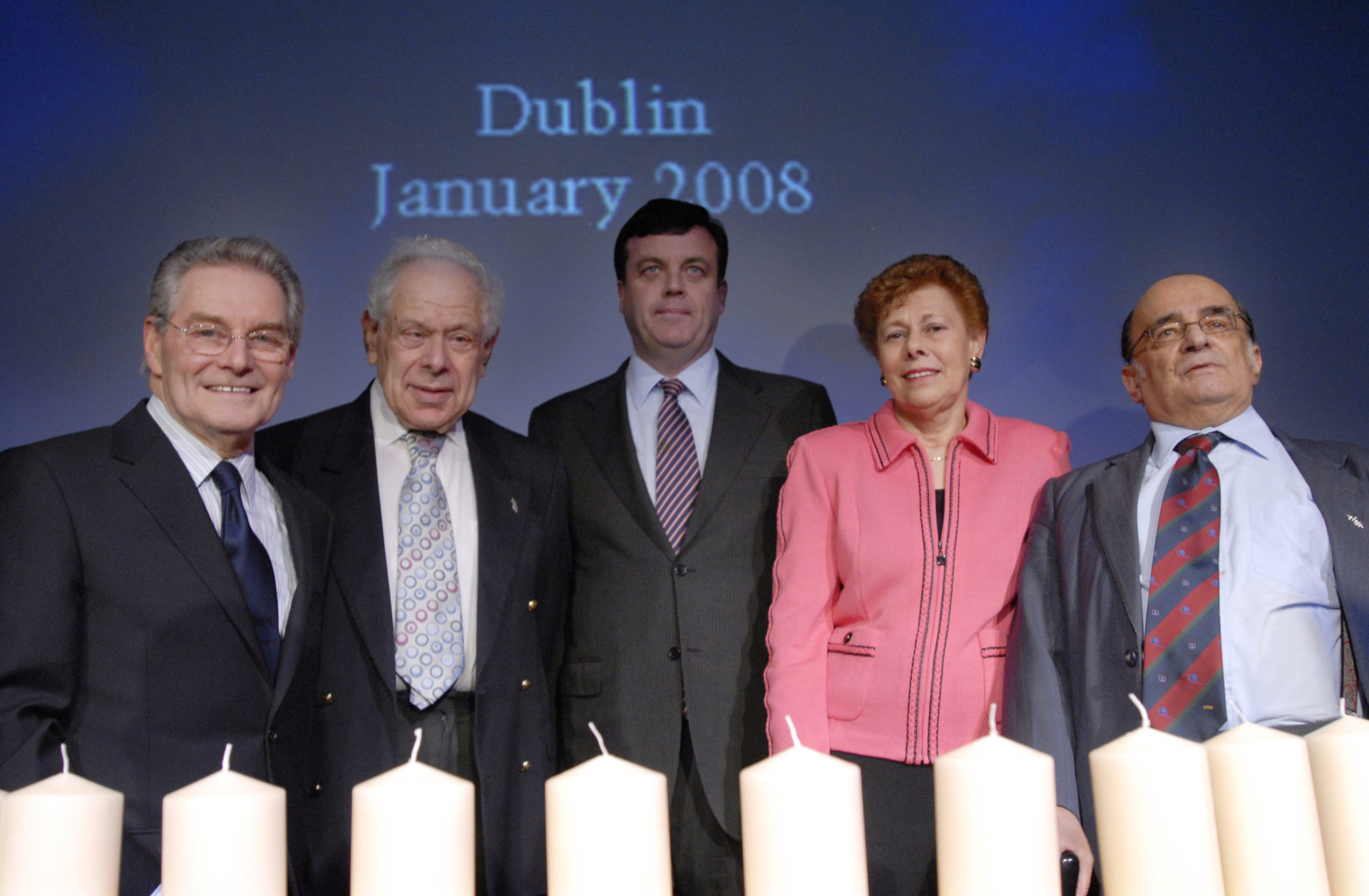 Holocaust survivors Tomi Reichental, Geoffrey Phillips, Suzi Diamond and Zoltan Zinn-Collis. Photo: Sasko Lazarov/Photocall Ireland
Holocaust survivors Tomi Reichental, Geoffrey Phillips, Suzi Diamond and Zoltan Zinn-Collis. Photo: Sasko Lazarov/Photocall IrelandDespite being surrounded by unimaginable horrors in Bergen Belsen, one thing even the Nazis could not extinguish was the child inmates' desire to make friends with each other.
For Suzi and one friend, the makeshift graveyards of Bergen Belsen were their playground.
“Every morning, the people who had died during the night, they took them and piled them outside your barracks door,” she said.
“So, each day the pile got higher and higher and higher.
“Being rather mischievous at my age, me and a friend of mine, we actually sat on the bodies until we were told, ‘You mustn't do that’.
“The ground was hard and they were better than sitting on the hard frozen ground.
“You got used to it. We didn’t think there was anything wrong in sitting on them.”
Liberty
On April 15th, 1945, the Nazis were in retreat and the Allies were pushing their way through Germany.
It was then that the 11th Armoured Division of the British Army arrived at Bergen Belsen, liberating the camp’s 60,000 inmates from Nazi tyranny.
Nearly 80 years on, Tomi’s memories of the liberation still bring a smile to his face.
“We heard this rumbling in the middle of the camp,” he said.
“We all ran to the barbed wire, we saw the jeeps of the British Army and they were shouting through a loudhailer, ‘This is the British Army, you are being liberated.’
“We didn’t even know what 'liberated' meant but they shouted it in Polish, Hungarian and different languages so people could understand.”
#Onthisday 15 April 1945 British forces liberate Bergen-Belsen concentration camp in Nazi Germany. A few months earlier, in February, Anne Frank and her sister Margot died in Bergen-Belsen. The exact dates of their deaths are unknown. @belsenmemorial pic.twitter.com/WpYGYsCoL6
— Anne Frank House (@annefrankhouse) April 15, 2023
Despite the joy of the liberation, the inmates of Bergen Belsen still had many more days of misery to endure.
Some even died after well-meaning British soldiers fed them too much food; after months of starvation, their weakened digestive systems were unable to cope.
Disease remained rampant and Suzi’s mother, Gisela, contracted tuberculosis.
“We knew at the time when people started coughing that there was no medicine and that she wasn’t going to survive,” Suzi said.
“She gave any bit of food to Terri and myself; one day, Terri was allowed to go in to see her and I wasn’t because they thought, being so much younger, that I shouldn’t see her.
“I didn’t know that she had died.
“Terri came out and said, ‘She’s gone' and I said, ‘Gone where?’
“I thought she’d moved to a different [hospital] tent or a different place. For a long, long time I didn’t realise that she’d actually died.
“They should have let me go in to see because we were used to seeing people dying and death.”
Afterwards, Suzi and Terri were looked after by Luba Tryszynska, a Jewish nurse who was nicknamed ‘the Angel of Belsen’ because of the care she provided to dozens of orphans in the camp.
They were eventually taken to Ireland by a Red Cross doctor, Bob Collis, and adopted by a local Jewish couple, Elsie and Willie Samuels, in Dublin.
Growing up, they were discouraged from dwelling on the horrors they had endured and there were very few other Holocaust survivors they could talk to.
Despite the horrors of life in the Third Reich, the desperate pleas of Irish Jews to let their loved ones move to Ireland had fallen on deaf ears.
The moment Holocaust survivor Suzi Diamond and other child refugees from the Bergen-Belsen concentration camp arrived in #Ireland, pictured in the arms of Dr Bob Collis (c.1947). Suzi still lives in #Dublin today.
-#holocaust #hmd22 #HolocaustMemorialDay #History pic.twitter.com/xbfuGrDwyC— Holocaust Education Ireland (@he_ireland) January 12, 2022
“During the Emergency, which was the Irish Government’s term for the Second World War, no permissions were granted for Jews to enter Ireland,” Holocaust Education Ireland founder Lynn Jackson said.
“There were many requests made by Jews living in Ireland asking for permits for their relatives to come in – that they would look after them, they would sponsor them, give them somewhere to live, make sure they had a job and not be a burden on the State.
“They still were not let in, so that’s quite a bad stain on Ireland’s war years towards the Jewish people.
“The Jewish people here were well treated but their family members were not allowed to come in.”
Holocaust Memorial Day
On January 27th, 1945, the inmates of Auschwitz were liberated by the Red Army as it pushed west towards Berlin.
Seventy-nine years on, the Sunday closest to the anniversary is marked across the world as Holocaust Memorial Day.
For Ireland’s Jewish community, it is an important date in the calendar.
“Members of the community go along to the National Holocaust Remembrance ceremony,” Jewish Representative Council chair Maurice Cohen said.
“People will also remember in their own homes, invite neighbours, parents from schools to listen to Holocaust survivors or their children and grandchildren tell the stories of their [survival].
“The Jewish world - and I think most of the world in general - realises that the Holocaust can never be forgotten.
“We must learn from the Holocaust to make sure that it never happens again.”
Antisemitism
Overall, Mr Cohen believes there is “very little” antisemitism in modern Ireland but he is hugely worried about the things people post on the internet.
“The people who need to sort that out are the social media companies, Governments and the European Parliament,” he said.
“When it comes to individuals, thankfully, there are no individuals who are openly antisemitic at the moment - we hope it stays that way.
“There is a lot of anti-zionism and anti-zionism can manifest itself as anti-semitism.”
Never again?
With each passing year, the number of survivors dwindles further and soon the Holocaust will pass from memory into history.
But could something like the Holocaust ever happen again? Suzi worries that it could.
“It doesn’t take much to strike a match,” she said.
“Once a match is lit, everything just escalates.”
At the 2020 Holocaust Memorial Day commemoration, Holocaust survivor Suzi Diamond recounted her story and urged the young people of Ireland to speak out against hate speech and Holocaust denial. Listen to Suzi below:https://t.co/LSG5cyE03c
— Holocaust Education Ireland (@he_ireland) December 12, 2023
The annual Holocaust Memorial Day commemoration will be livestreamed between 4 and 6pm this Sunday.
Holocaust Education Ireland's annual lecture, 'The Holocaust as World History' by Doris Bergen, will be delivered on Wednesday February 7th at 18.30 in Trinity College's Edmund Burke Theatre.
You can listen back here:
Main image: President of Ireland Michael D. Higgins meets with Holocaust survivors Walter Sekules, Suzi Diamond and Tomi Reichenthal at the National Holocaust Memorial Day Commemoration event in Dublin's Mansion House.


